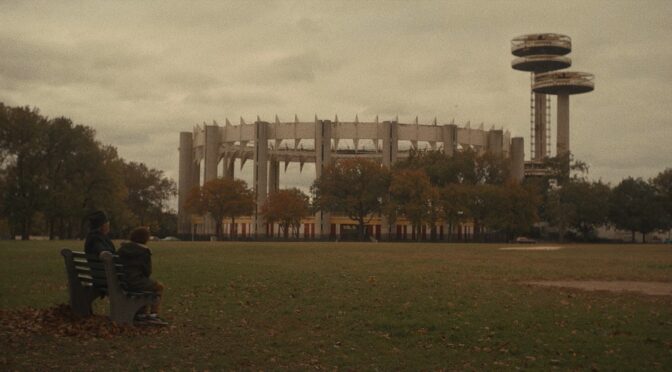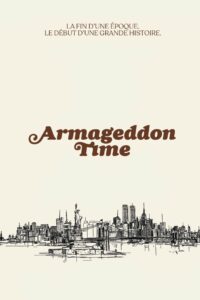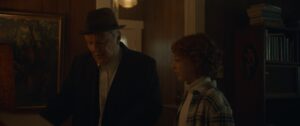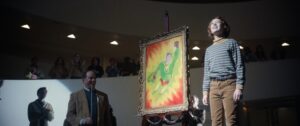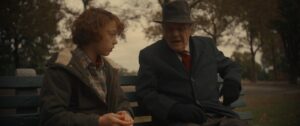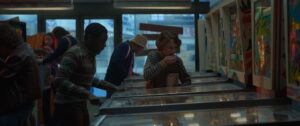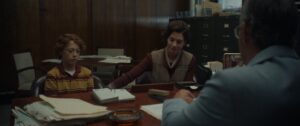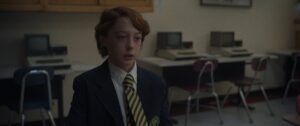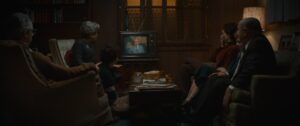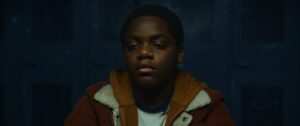James Gray is a director of eclectic sensibilities. So even though his latest gem is set in the 1980s and mostly makes use of golden age hip hop and Clash-style punk for its soundtrack, I’m sure he wouldn’t mind me busting out a little 90’s skate punk as a jumping off point for digging into his film. I enjoy the band NOFX quite a bit, in all their goofy, major chord glory. I am particularly fond of their 23-minute opus “The Decline”, a fiery, tonally diverse suite song that calls out the evils of everything from gun violence to anti-intellectualism to draconian marijuana laws. But its central thesis critiques a certain kind of myopic selfishness that feeds on fear. It’s the kind of frightened covetousness that turns garden variety self-interest into an all-consuming blaze of egomaniacal survivalism. One which transforms “my family comes first” into “my family comes only”. The idea that we only have the resources to care for our own, regardless of the consequences of that mindset. In the song’s rousingly cynical closing act, the learned emeritus Fat Mike roars out, “Fellow members, Club We’ve Got Ours. I’d like to introduce you to our host. He’s got his. And I’ve got mine. Meet the Decline.” This sprawling punk anthem came back to me as I watched James Gray’s autobiographical account of liberal New York Jewish family negotiating and painfully compromising their principles at the dawn of Ronald Reagan’s first term. Gray’s story is one of 2022’s most intellectually rigorous and deeply disquieting films because the people it most strongly takes to task are basically decent. The powerful advocates of classism and racism are mostly tucked away in the shadows and unseen. Gray alludes to the unscrupulous and the powerful intermittently (particularly by using the 1980 Presidential election as a loose framing device), but Armageddon Time is really the story of people who want to do the right thing. It is about people who want to be seen as compassionate but find themselves tripped up by the hurdles of prejudice, opportunism, generational trauma and moral cowardice. It is a potent and dismaying look at how American society prioritizes some people while stigmatizing others, and how even the well-meaning can be separated from their morals by the strong paternal hand of that society.
It’s the autumn of 1980 in New York City and a good-hearted but headstrong young Jewish boy named Paul Graff has just begun the sixth grade. Paul dreams of being an artist but his talent gets him sent to the blackboard on the first day when he draws a (quite good) rendering of his balding teacher. He doesn’t have to suffer his punishment alone for long, however, because another student all but volunteers to be punished with him. The teacher calls out the name of a young black boy, Johnny Davis. “The name’s Bond. James Bond”, the charismatic youngster suavely replies. They win their classmates’ laughter together and lose the right to participate in gym exercises for the day. Paul walks Johnny to his bus (Johnny lives in a poor neighborhood with only his grandmother) and they chat. They talk about Johnny’s dream of being an astronaut and the upcoming class trip to the Guggenheim Museum. Paul promises to pinch a 20-dollar bill from his mother’s purse so Johnny can afford to go on the outing. Paul lives a comfortable life, though his father (Jeremy Strong, strong) labors as a working class repairman. His maternal grandparents are wealthy enough to help the family. His older brother attends a rich private school downtown. His mother (Anne Hathaway, as great as I’ve seen her in quite some time) is a driven woman with plans to run for head of the District School Board. They live in a well-kept townhouse. Paul is especially close with his British-Ukrainian grandfather on his mother’s side, Aaron (an endearing and superb Anthony Hopkins giving one of the year’s truly great supporting performances). Aaron is a noble and doting man, always giving the Graff sons gifts and encouragement. He represents the very best angels of the Graff family, but even he has a somewhat stifling sense of familial tightness. He has known scarcity and hardship and a certain greedy fearfulness vibrates just below his genteel surface. His own Ukrainian mother saw her parents murdered by anti-Semitic hooligans. That was when she moved the family away from the Ukraine to Liverpool and from there across the ocean to New York City. The Graffs have had to fight prejudice and hate to become the modestly successful American family they are and they live with the uneasy feeling that it all could be taken away from them in an instant. That is why, when Paul’s blossoming friendship with Johnny lands him a suspension (they are both caught smoking pot in the stalls), even kindly Aaron supports the decision to pull him out of public school and send him to the lofty, elite school his older brother attends. Paul is being pulled in two directions by his close bond with a nice, misunderstood black boy and by the many forces that want to groom him into the thing that Johnny will never be allowed to be: a powerful, accepted cog in society’s upper echelons. The private school does not settle the war for Paul’s soul, it only starts it. It does not conclude the matter of Paul’s affluent future as his family hopes. Instead, the whole ordeal and especially his painful separation form Johnny opens Paul’s eyes to ugly and systemically violent truths about the American Dream and which people are handpicked to take part in it. Moreover, it sets in motion a tragedy that irrevocably changes these characters and alters the destiny of the man directing this film.
James Gray is much too eclectic of an auteur to be hemmed in by the kinds of stories he tells. He’s one of the last directors you could ever pigeonhole. He has been back to the turn of the century (The Immigrant and his masterpiece The Lost City of Z), into the future (Ad Astra) and occasionally to the present (Little Odessa and Two Lovers). His films have gone to Edwardian England, the remote Amazon, the far reaches of outer space and frequently returned home to his native New York City. If there’s a germ of a consistent theme to be found in his work, I think it’s the heavy yoke of family and expectations. In Ad Astra, Brad Pitt’s astronaut sets out to find a father whose approval he has always craved, while that same father has suddenly cast off a lifetime of societal expectations by going rogue. The Lost City of Z‘s Percy Fawcett starts as a social striver trying to clear his tainted family name before a chance to make good by mapping the Amazon points him down a path that is his alone. But while he loses himself in his beloved rainforest, the question that looms is whether he is doing right by his family back in England. Family and society are primal forces to either surrender to or rebel against but, no matter what, you can never entirely get away from them. Not even light years away from Earth. They are fundamental fields of gravity that govern life as James Gray sees it and all of us define ourselves, rebel and conformist alike, by how we respond to them. In Armageddon Time, Gray renders the vision of his own family with fairness and empathy but also with merciless honesty. Family can be an unflattering thing; poison and antidote in one bottle. He shows the Graffs’ fearful selfishness, their blind entitlement, their internalized racism, their years of suffering anti-Jewish bigotry now unthinkingly projected out at the next marginalized group. He captures a brutal beating at the hands of his stern, emotionally repressed father. If Avatar: The Way of Water posits that family is a fortress, Armageddon Time adds that it can be a fortress under siege with us trapped inside of it. Family can protect us but it also has the power to suffocate and drive us mad. The entire institution of family carries with it the uncomfortable notion that our empathy is already partly spoken for, that we reserve a larger portion of our kindness and care for this one group of people that shares our genes. Armageddon Time is James Gray’s gently harrowing account of learning that opportunity and dignity are not apportioned equally in America. The brilliance of Gray’s film is in how he sees family as a snapshot of that harsh societal truth in miniature.
Armageddon Time is about as insightful a film about white privilege as I have ever laid eyes on. What makes it so biting is how it sees racism and privilege as the result of both deliberate cruelty and unconscious self-obsession. I was reminded of something Brad Dourif’s doctor from Deadwood says: “I see as much misery out of them moving to justify their selves as them that set out to do harm.” A society of racial injustice and unequal opportunity is built a brick at a time by the justifications of individuals afraid for their own position; by those who fear that they only have enough capacity (of money, of time, of emotional energy) to see to themselves and their own circle. The gravitational pull of self-interest is hard to resist. Fat Mike has it right. He’s got his and I’ve got mine. The Graffs are basically well-meaning people. They do not espouse hateful rhetoric, even if they do fall right into prejudiced line the second one black boy’s existence poses some vague threat to their child’s future. There is an unspoken theme in Armageddon Time about how people act out their own past oppression against other exploited groups, passing their victimization along like a hot potato. The Graff family is vocally against Ronald Reagan but they are blithe participants in the society that is about to welcome Reaganism’s self-serving myopia with open arms. They may be registered as Democrats but they eagerly push Paul into a school and career track populated by the sons of the greedy, powerful and unprincipled. Many, this critic included, are perfectly willing to attack a system solely interested in securing prosperity and safety for a privileged handful of whites, but it takes a different sort of courage to disavow the benefits we receive from that system. To refuse what you are given and let your advantage go unused. Armageddon Time understands how hard it is for ostensibly progressive white people to refuse the money, so to speak, even when we know it has been stolen from the disadvantaged. We can critique the unjust enrichment of white over black all day long, but there is a tendency to do so in a very generalized way; a way that leaves our own selves out of the problem. The Graffs know things shouldn’t be the way they are, but they also feel they could really use any leg up that America is offering them. Even the noble and tolerant grandfather Aaron won’t say no to this arbitrary fortune. He accepts special treatment and remembers how recently the shoe was on the other foot. How not very long ago it would have been a Cossack’s boot breaking down their door. “The system is rigged and unfair,” we cry out and then discreetly drop the tainted coins into our pockets.
Armageddon Time is an intimately observed coming of age story for James Gray but it also has the foreboding of a slowly unfurling horror movie. The slasher waiting in the bushes is nothing less than the American 80s, and nobody’s ideals or best liberal intentions are safe. Gray’s wise, sober little tale has the clammy panic of a waking nightmare. The more Paul watches all of society degrade and devalue Johnny (from uncaring teachers who write him off to the police to even other black adolescents), the more incensed Paul becomes. That’s when the world starts to take on truly chilling undertones. Because he learns that all his righteous indignation, disgust and sorrow can’t give him the courage to really do anything about this injustice. The Armageddon in question is the total paralysis of human empathy and social action; the failure of our own convictions when we have to make a choice that might threaten our own interests. Meanwhile, Johnny Davis knows where his story is headed from the beginning. His resigned, worn out face tells us everything we need to know. He is heartbreakingly aware that no future has been set aside for him. When Paul worries about his teacher punishing them for ditching a field trip, Johnny chuckles knowingly and says, “Nothing’s gonna happen to you, man.” Johnny has Paul’s back with a tender ferocity. He doesn’t have a chance against this depraved system, but it hurts him to see it grind down his friend. Paul sadly finds himself tongue-tied when two rich classmates at his new school ask him if he ever went to school with blacks (but of course they don’t use the word “blacks”). The Graffs watch a Reagan interview where the incoming President warns that this generation might be the one to usher in Armageddon. His Armageddon is a rhetorical weapon, a fear cudgel that he will soon use to help herd America into a notoriously conformist chapter of its history. The true Armageddon isn’t what Reagan says it is but, in getting the American populace to buy into the idea, it does become a kind of self-fulfilling prophecy. The real cataclysm is the wilting of the American soul in the face of manufactured fear. The compromising of Americans’ principles as more of them prioritize their financial security and make peace with the limits of their power to help the stigmatized, brutalized and neglected. Sometimes that racist abuse takes the form of plain old neglect. When Paul is sent to the principal’s office, the principal doesn’t know what to do with him and sends him right back to class. The message is actually crueler than mere punishment. Society has repeatedly let Paul know that it doesn’t much care where he goes or what happens to him, just that there’s no real place for him. He simply doesn’t matter. I have heard and digested the criticisms of Armageddon Time as being just another exercise in white guilt. But I find James Gray’s self-immolating autobiography so clear-eyed and scorching that it avoids navel-gazing. It never feels like an act of indulgent self-flagellation or pat forgiveness. Certainly not forgiveness of any kind. It sees the human beings at the center of this story in all their dimensions, but it never lets a one of them off the hook. Under its muted, autumnal visual palette, Armageddon Time breathes a rebuking fire that consumes Gray’s loved ones and himself.
The problem Armageddon Time sees is how the future is forever being held back by the past. The way that, even if you were to assemble enough people who genuinely want to create a more equal and equitable world, they would need to sacrifice personally. They would need to agree to break with traditions that have protected and enriched them. Real justice would require drastic change, and whoever created the system as it currently stands was cunning enough to entangle a lot of white Americans in it; to make sure that each of them has enough of a piddling token stake in the status quo that they feel they would suffer some detriment from altering it. In the way it sees the morass of self-interest and complacency as the enemy of progress, Armageddon Time reminded me of The Wire, David Simon’s revelatory show about law, crime and city politics in Baltimore. Various characters in that show envision and try to implement better, fairer ways of governing and policing. Better ways of being as a society. And the stark brick wall reality that they always butt up against is that it’s very difficult to get people to change an unjust system that they own shares in. If only half the people in that system didn’t want to be judges and higher-ups, The Wire‘s unorthodox Detective McNulty laments. “But no, everybody stays friends. Everybody gets paid. And everybody has a fucking future.” It’s just what Paul Graff’s family is doing when they place him in that private academy full of future judges, politicians and CEOs. They are buying him into that safe future that is so very beholden to the craven past. In what could have been too on the nose, the first person Paul runs into on his first day at rich school is Donald Trump’s father, Fred Trump. He is there with his daughter Maryanne Trump Barry, an Assistant United States Attorney. She has come to the school’s assembly to tell this auditorium full of privileged white boys the unvarnished truth. The future has been prepared specially in advance for them. It has been paid for and gift wrapped to be given to them on a day not so far from today, in a year not so distant from 1980. It is of course expected that they will one day reciprocate for their own kind, ensuring that the right to peace and prosperity is handed down to the chosen people who will gather in this same stately hall decades from now. Armageddon Time does not actually get its title from that Reagan interview. It’s instead a reference to “Armagideon Time”, a 1970s reggae song by a black Jamaican named Willie Williams. It was later covered by a white British band called The Clash. The song is about poverty and inequality and fighting back against systemic evils. There is not much hope in Armageddon Time outside of a small moment of symbolic victory for Paul. But there may be a nugget of hope in the lyrics of “Armagideon Time”, a reminder of what needs to be done. “A lot of people won’t get no justice tonight,” Williams sings. “Remember to kick it over.”
